 Petzlover
Petzlover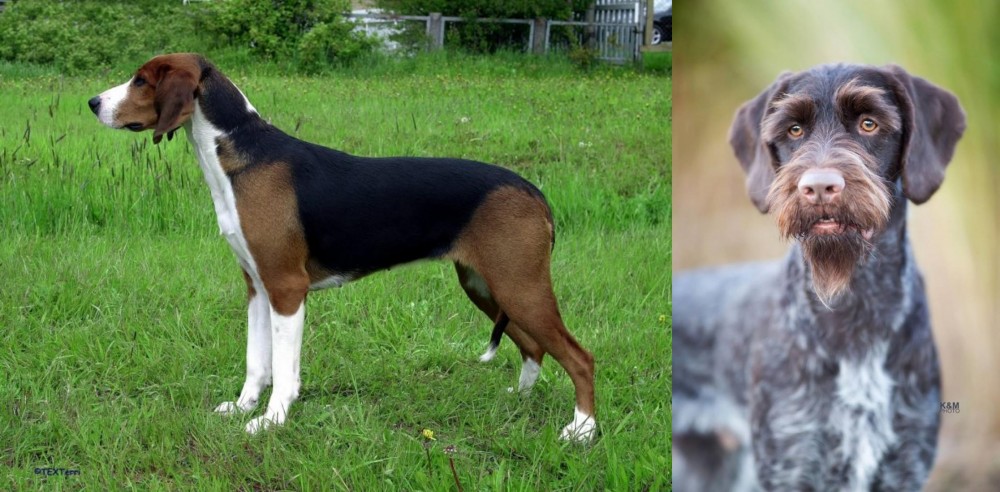 Finnish Hound is originated from Finland but German Wirehaired Pointer is originated from Germany. Finnish Hound may grow 6 cm / 2 inches shorter than German Wirehaired Pointer. Finnish Hound may weigh 7 kg / 15 pounds lesser than German Wirehaired Pointer. Both Finnish Hound and German Wirehaired Pointer has almost same life span. Both Finnish Hound and German Wirehaired Pointer has almost same litter size. Finnish Hound requires Low Maintenance. But German Wirehaired Pointer requires Moderate Maintenance
Finnish Hound is originated from Finland but German Wirehaired Pointer is originated from Germany. Finnish Hound may grow 6 cm / 2 inches shorter than German Wirehaired Pointer. Finnish Hound may weigh 7 kg / 15 pounds lesser than German Wirehaired Pointer. Both Finnish Hound and German Wirehaired Pointer has almost same life span. Both Finnish Hound and German Wirehaired Pointer has almost same litter size. Finnish Hound requires Low Maintenance. But German Wirehaired Pointer requires Moderate Maintenance
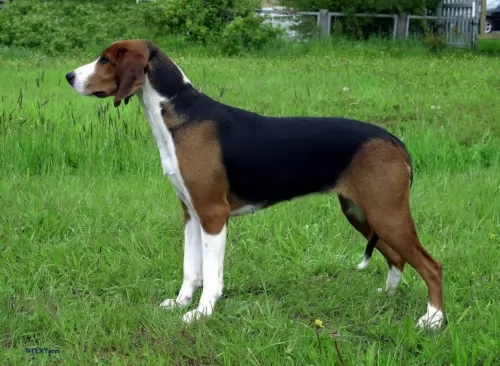 As one of Finland’s most popular dogs, the Finnish Hound isn’t particularly well known outside of Finnish borders. Known also as the Finsk Stovare, the Finnish Hound, known for its hunting skills, came about because of a breeding effort which started way back in the 1800s, mixing dogs such as different French, Swedish, and German hounds.
As one of Finland’s most popular dogs, the Finnish Hound isn’t particularly well known outside of Finnish borders. Known also as the Finsk Stovare, the Finnish Hound, known for its hunting skills, came about because of a breeding effort which started way back in the 1800s, mixing dogs such as different French, Swedish, and German hounds.
These hounds were used with the idea being to develop a dog that could do well in Finland’s terrain. The Finnish Hound is a great hunting dog but isn’t looked upon as an particularly awesome pet, although some pet owners would beg to differ.
 Medium to large sized, the German Wirehaired Pointer is a griffon type dog breed hailing from Germany and developed for hunting purposes in the 19th century.
Medium to large sized, the German Wirehaired Pointer is a griffon type dog breed hailing from Germany and developed for hunting purposes in the 19th century.
Known as the Drahthaar in Germany, the dog is a mix of griffon, Deutscher Stichelhaar, German Shorthaired Pointer, Deutscher Kurzhaar as well as the Pudelpointer.
He was imported into the United States in the 1920s, and it was in 1953 that the German Drahthaar Club of America was formed.
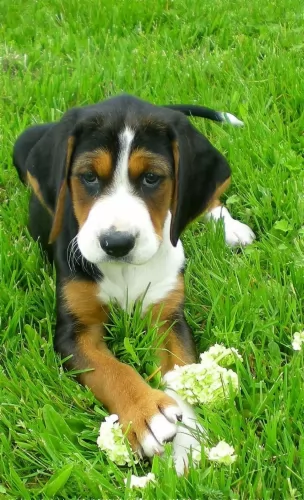 This is a medium sized dog who stands between 52 – 62cm in height and weighs in at 20 to 25kg. The Finnish Hound can have between 4 – 8 puppies.As a scent-hound, the Finnish Hound has a short, smooth double coat which is usually in a tri-color pattern of black, tan, and white.
This is a medium sized dog who stands between 52 – 62cm in height and weighs in at 20 to 25kg. The Finnish Hound can have between 4 – 8 puppies.As a scent-hound, the Finnish Hound has a short, smooth double coat which is usually in a tri-color pattern of black, tan, and white.
The attractive dog has an athletic, lean, muscular body full of energy and stamina. The eyes are brown and the dog has a peaceful expression. The medium length ears are floppy and the tail is long and carried low.
The Finnish Hound is friendly, calm and never aggressive. He is an intelligent dog nd will respond to the training and socialization he will require to turn him into an obedient, amicable pet, especially since he tends to be stubbon, independent and strong-willed. He isn’t recommended for small places in the city but will do better in the country with a fairy large piece of ground. The Finnish Hound is not recommended for apartment life. It is moderately active indoors and does best with at least an average-sized yard.
 Well muscled, this is a medium to large sized dog standing at between 57 and 68cm in height and weighing between 27 and 32kg.
Well muscled, this is a medium to large sized dog standing at between 57 and 68cm in height and weighing between 27 and 32kg.
He has a weather resistant wiry coat which is of medium length and which is wiry and harsh. Coat color is liver and white as well as black flecked.The undercoat provides insulation against the cold.
He has quite a bit of facial hair in terms of eyebrows, beard and whiskers.He has webbed feet, typical of German Pointers. His tail is docked to about two-fifths of its natural length, but these days it is often left long.
Lively, playful, affectionate and intelligent, the German Wirehaired Pointer is easy to teach. He becomes wonderfully obedient with training and socialization and responds well to instructions to sit, come and stay.
He is an active dog and likes to be involved in the activities that his human family are involved in. He becomes bored and frustrated when he doesn’t get the exercise and attention he craves.
He isn’t suited to life in the city where the premises are small as he needs plenty of vigorous exercise every day. They do well in the country where they have plenty of place to run and where their hunting skills come into action.
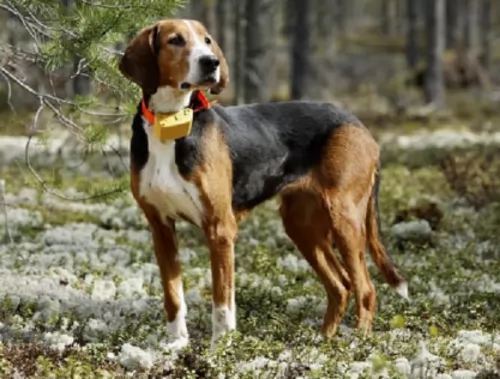 The Finnish Hound has always been a working dog and so he will require being well exercised.
The Finnish Hound has always been a working dog and so he will require being well exercised.
He makes a good pet with homes where there are other dogs as well as children. As a hunting or working dog, these days the Finnish Hound is also regarded as a companion animal, fitting into family life well, and turning out to be a loving, loyal pet.
 German Wirehaired Pointers make awesome pets as they’re lively, playful, social and loving. They particularly suit living in a home where the people are active, outdoor types.
German Wirehaired Pointers make awesome pets as they’re lively, playful, social and loving. They particularly suit living in a home where the people are active, outdoor types.
They make superb jogging- or cycling companions and will thrive on sharing these activities with a family member. He is a dog who has a need to be loved and included in all that his family gets up to. He wants lots of pats and stroking to show him that you care.
Give him the love and care he craves and you’re guaranteed to have the most wonderful loving pet.
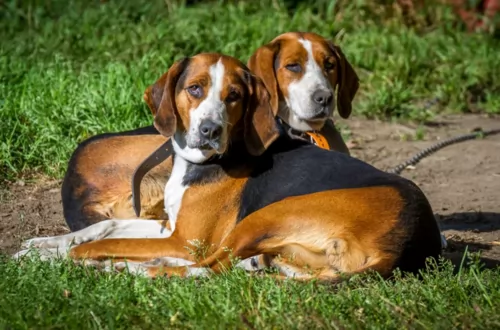 The Finnish Hound is looked upon as a generally healthy breed who can get to 12 years of age if looked after well. Good nutrition plays a huge role towards excellent health.
The Finnish Hound is looked upon as a generally healthy breed who can get to 12 years of age if looked after well. Good nutrition plays a huge role towards excellent health.
Check out common health ailments that can affect most dogs such as dental disease, obesity, hip dysplasia and a serious condition for which these dogs are particularly known – cerebellar ataxia. Lesions in the brain affect the dog’s coordination and sight. Get him to the vet as soon as you detect anything unusual with your pet.
 German Wirehairs are generally healthy, and when you look after them well they can reach 12, 13 or 14 years of age. Also, if both German Wirehaired Pointer parents have certificates proving they were tested and cleared of hip dysplasia, hereditary eye diseases and blood-clotting disease, then your pet will have less risk of developing these conditions.
German Wirehairs are generally healthy, and when you look after them well they can reach 12, 13 or 14 years of age. Also, if both German Wirehaired Pointer parents have certificates proving they were tested and cleared of hip dysplasia, hereditary eye diseases and blood-clotting disease, then your pet will have less risk of developing these conditions.
Your pet isn’t likely to get sick, but like all breeds of dogs, they're prone to certain diseases and conditions. Hip Dysplasia is something that can be noticed when your pet is still a puppy.
This is a heritable condition where the thigh bone doesn't fit properly into the hip joint. Your dog can battle with pain so that he no longer wants to play, he battles to get up after lying down and he may even begin to show signs of lameness. Arthritis can develop too.
You’ll notice cloudiness on the eye lens that can grow over time. Not all cataracts impair vision, although there are some instances where vision loss is experienced. Cataracts can sometimes be surgically removed with good results.
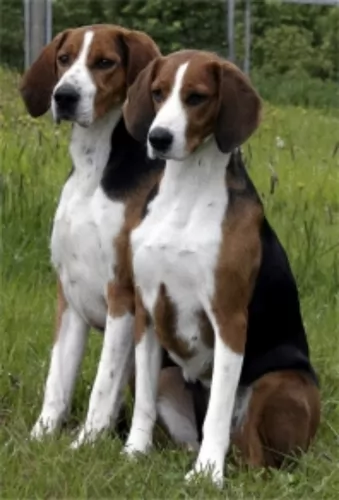 As a medium-sized dog breed, you want to make sure to feed your dog a high-quality commercial dog food – one that has been formulated with the right amount of vitamins and minerals for the type of dog he is.
As a medium-sized dog breed, you want to make sure to feed your dog a high-quality commercial dog food – one that has been formulated with the right amount of vitamins and minerals for the type of dog he is.
He is a high-energy hunting breed, so you wan to find a food that is appropriate to his needs. Home cooked brown rice, vegetables and chicken can be added into his kibble as a change and a treat from time to time as well as some raw meat occasionally. Make sure he always has access to fresh, cool water.
Physically active and mentally balanced and intelligent, the Finnish Hound will require both physical and mental stimulation to prevent him from becoming bored and frustrated.
As an average shedder, your pet's smooth, short-haired coat is easy to keep in tip top condition. All that is really required is to brush the coat down twice a week to keep it in peak condition.
Don’t neglect to check the inside of the dogs ears, as too much dirt and wax can cause nasty ear infections. Also, the teeth need to be brushed at least 2 or 3 times a week with special canine toothpaste and toothbrush. This will ward off tooth decay and lots of other problems within the body brought about by bad teeth.
 Your German Wirehaired Pointer isn’t a heavy shedder so brushing his coat twice a week will be ideal for him to rid the coat of loose hairs.
Your German Wirehaired Pointer isn’t a heavy shedder so brushing his coat twice a week will be ideal for him to rid the coat of loose hairs.
Your German Wirehaired Pointer is an active dog and this has to be taken into account when looking at diet. He will require a diet with quality protein. You’ve also got to look at things such as whether your dog is neutered or spayed as they require less calories. On the other hand there are dogs that will require more calories because of their activity levels.
Make sure your German Wirehaired Pointer eats a top quality dog food. Add in some homemade food such as cooked brown rice, chicken and vegetables from time to time as well as some raw meat. You have to constantly remember that your dog’s health depends on the nutrition you provide.